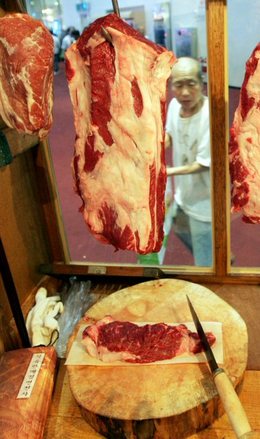Posted on : Oct.14,2006 14:02 KST
Modified on : Oct.16,2006 12:51 KST
U.S. urged acceptance of meat with bone fragments, feared for mad cow disease
According to the Ministry of Agriculture and Forestry on October 13, the U.S. Department of Agriculture last month urged South Korea to approve imports of beef with bone fragments.
Under current import conditions, if imported beef is found to contain special risk material (SRM), such as bone fragments, imports of U.S. beef will be stopped. U.S. beef had previously been banned in South Korea and Japan following the discovery of mad cow disease in the U.S.; bone matter is how the disease is thought to be transmitted to humans. South Korea’s ban lasted from December 2003 to January this year, when it agreed to begin permitting imports of bone-free beef from U.S. cattle under 30 months old.
The government, however, has delayed imports of U.S. beef, citing an unspecified "hygiene problem," and finally decided to resume imports on September 8. However, no U.S. beef is back on the domestic market yet.
According to the ministry, the U.S. letters said that "during the slaughter process, bone fragments or cartilage can get into the beef, but they have nothing to do with mad cow disease."
Lee Sang-gil, an official of the ministry, said, "If bone fragments are found in the quarantine process, shipments of U.S. beef will be sent back and shipments from the sites involved will be suspended," adding, "in order to prevent such a situation, the U.S. beef exporters are waiting for the bone fragment problem to be resolved." The U.S. Department of Agriculture may have sent letters to the South Korean government after being pressured by the U.S. beef industry, he said.
Regarding this, Lee said, "We will maintain our position not to import beef cuts containing bone fragments according to the agreement reached in January. We are going to convey such a message through the U.S. embassy in Seoul after we understand the U.S.’s intention."
Hong Kong has also temporarily suspended imports of U.S. beef in March of this year after small bone fragments were found.







